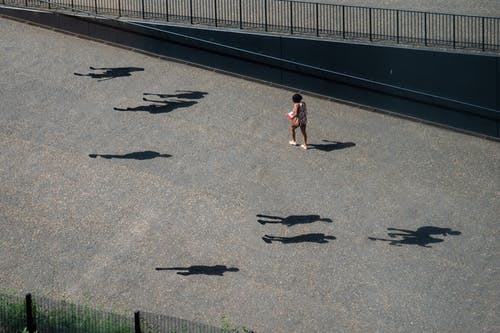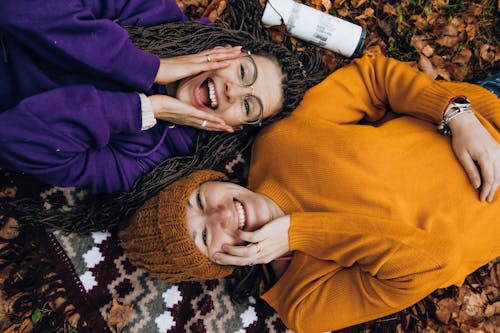
How do I make friends during a pandemic?
A couple of months ago, I joined an online community for young women who had just graduated university. It’s kind of a support network for recent female graduates, but the posts on the page cover much more than that. It’s a genuine community, like a massive group chat. Girls living on the other side of the world tip each other off the about an upcoming online sale, or an amazing career opportunity, or even something as simple as a tasty recipe hack or accommodation advice.
It’s a genuine and earnest online effort at connection and community, and honestly? In a pandemic, it was exactly the motivation and social outlet that many of us need.
One post in particular caught my eye the other day, because of the overwhelming response to it. A woman explained how all her friends she’d known all her life were now married and having children and sorting out their plans for the future. Meanwhile, she found herself at a completely different stage and lacking friends who wanted to do the same things as her and had similar responsibility levels to her.
‘How, at this age, do we make new friends?’ she asked.

This is not a new question. Dolly Alderton and Emma Gannon’s latest books look at these exact themes, of the woman who finds herself in her late twenties and early thirties and has no children, while her friends are consumed by that stage in their lives. How, especially in a pandemic, do you meet like-minded people?
At this stage in our lives, it is particularly difficult to make and hold onto connections. Without the structure of school and college experiences, we don't naturally run into people our own age with similar interests. Generally, our social sphere at this age is work, family and old friends and even this has been reduced by the pandemic. Your ‘night out’ friends may even have dropped off your connection map entirely and there are no opportunities to come across new people when our bubbles must be small and maintained.

At this already precarious stage in our lives, the pandemic has made life all the more isolating and unsettled. This strange in-between phase has found many of us suddenly living at home again only to realise our hometown friend have either married or moved away, our social workplace has died an untimely death and we’ve realised some friendships just can’t survive the Zoom test.
Loneliness is the new pandemic and we are making strides to fight it. Japan just recently appointed a Minister of Loneliness, new BBC research shows that 16 to 29-year-olds are twice as likely as the over-70s to feel cut off, despite more campaigns than ever popping up all over the UK and Ireland to combat the lack of connection and poor mental health resulting from lockdown. And those campaigns are vital and important – but what if you actually just want someone to have a chat with? How do you find someone to do that now?
Smoking areas, festivals, communal areas in hostels while travelling, workout classes, community programmes, charity work…in normal times.
So, what about abnormal times? How do we make virtual connection that feels real in the age of social media that is anything but social?
Past relationships

Advice online says to look into your past relationships. Have any connections been lost or faded into the mists of time in the last few years? It’s easy to drift out of contact, especially when children, or university or a move away happens. If nothing else, the pandemic has taught us that keeping connections alive through a screen is exhausting and only the inner circle of friendship can survive it. But now that we’re all more used to Zoom catch ups, are there any unfinished friendships from your past that you think you could rekindle? Is there a person out there from an old job, a college course, or even school days that you feel you might be able to pick things back up with again?
I recently reconnected with a friend I hadn’t spoken to in over four years. We had a tradition of meeting up for a long dinner twice a year and catching up on the last six months, and it was never awkward. We always picked right back up where we left off, and there was no pressure for the friendship to be more than that. We understood we had a deep connection and enjoyed each other's company, but a busy schedule and living far apart was an understandable barrier. The year we both moved away was the first time we didn’t meet up and the friendship just petered out. It wasn’t intentional, nor was there any bad feeling – we would hear from mutual friends about one another and think, God, I must message her to meet up – but life just got in the way.
But in the last year we reconnected, and it was like I had seen her yesterday. We met up for a distanced walk and talked for four hours – literally, non-stop, for four hours. Just because a friendship may have naturally drifted away due to distance, busyness or whatever other reason, doesn’t mean it should be discarded, or that meeting up again will be awkward. They could very well be delighted you reached out – some people just can’t make the first move to bridge that gap of a few years. Don’t make it awkward by pretending to know where they are or what they’re doing – outright asking takes the pressure off the situation of pretending to have kept up so you can both open up honestly and have a real catch up.
Lean into your hobbies
Other advice I’ve heard floating around online, specifically for making new friends, is to look further into what you like to do. Are you into reading? Sport? Baking? It could be your key to putting yourself out there.

The thought of approaching someone randomly on social media can be daunting – unless you have some sort of connection. I recently became part of the book community on Instagram, and by following and interacting with accounts that are reading and reviewing books you like, you have an instant conversation starter. Chatting back and forth about plots or characters in the comments can soon become a reply to a story about a new favourite book and before you know it, the conversation and relationship expands.

Another way to try this is to join an online club, if joining a large online community seems a little too scary. Something smaller, like an online local bookclub, charity, workout group, might be more your scene and it could blossom into an offline friendship if the group you join is local. There are plenty of bookshops, gyms, arts centres and more places that have had to adapt to online life and they all have innovative ways of connecting us all – it just takes a little research to see what’s happening near you!
Industry events
Even though the pandemic office is online, it doesn’t mean that there aren’t opportunities for networking and connection – and I’m not just talking LinkedIn, although that is a good resource at the moment. If you love your job, it could be an opportunity to connect through your profession. Reach out to societies that aim to tackle problems within your industry and undoubtedly, there will be some sort of Zoom event about the isolated workplace and how to combat it. There will be online networking events, professional development courses, or even just talks with some industry experts.
Aside from levelling up in your career, you may come across someone similar to you, asking the questions that occur to you too, and reach out to them after the event. The event creates the talking point – a shared problem, a shared interest – and it could blossom from there. Especially in more precarious freelance positions, there are whole communities out there that are full of forums and networks to link up on. If it starts out as a work connection, it doesn’t have to stay that way – you could discover a mutual love for a TV show, a sport, or anything you’re both interested in.
I recently joined a writer’s workshop that is partially about professional development, but also is largely to create a social network of local writers for support, friendship and advice about opportunities or competitions. It meets most Fridays – albeit via Zoom – but it has created a sense of connection as we get to know each other better each week. I know after all this is over, any writing or arts events I go to in my local area, I’ll know at least a few faces in the crowd.

Friendships are built upon consistency, shared interest, effort and trust. Most of these things take time to build and nurture – especially if that interaction is happening online. If you click with someone, fantastic! If you don’t, it’s not the end of the world. Think about what interaction means to you – which conversations and people rejuvenate you and which ones drain you? Look for these indicators in life to see where your true connections lie.
And most importantly, we are all in the same boat right now. Almost all of us are working from home and none of us have the opportunity to randomly come across people right now. We’re all feeling this lack of connection. So, if you reach out to someone who doesn’t respond or the interaction doesn’t work out, that’s okay. If they aren’t delighted to hear from someone new when we’re all stuck staring at the same few faces every day, then that’s their problem. Put in the time with those who deserve it, allow trust to build up and let it grow organically. You can’t fake or force connection, online or offline.










